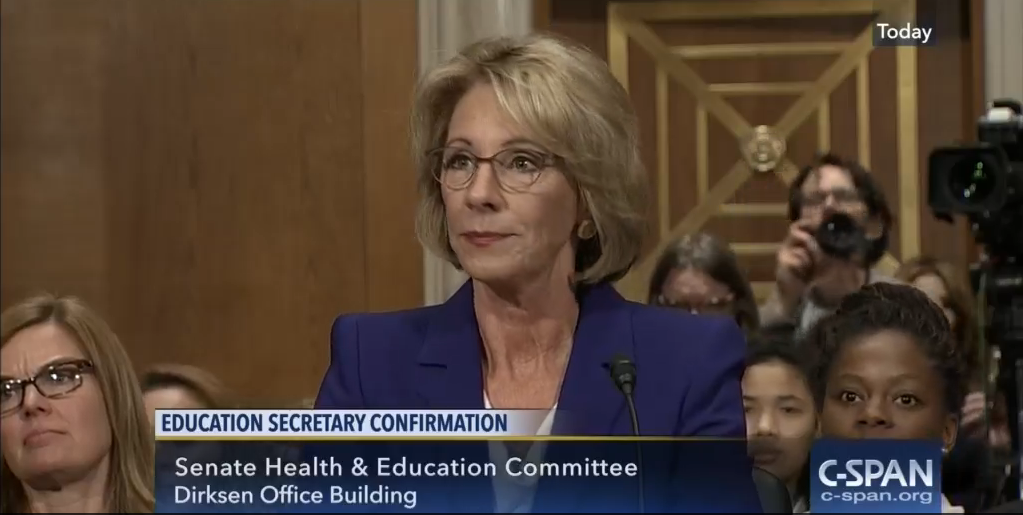Abortion rights, women of color, and LGBTQIA+ people are under attack. Pledge to join us in fighting for gender justice.
Happy 52nd Anniversary to Title IX! Here’s What You Need to Know about Biden’s New Title IX Rule.

Updated September 9, 2024
Title IX turned 52 this year, and students across the country looked forward to starting the 2024-25 school year with a new Title IX rule in place. In April 2024, after multiple delays, the Biden administration’s Department of Education finally released a new Title IX rule that strengthens protections for student survivors of sex-based harassment and clarifies protections for LGBTQI+ students and pregnant and parenting students. The rule became effective on August 1, 2024, but 26 states and hundreds of schools are currently subject to court orders that temporarily block the new rule. The Supreme Court kept two of these temporary blocks in place while the courts below decide these cases. Here’s what you should know about the rule.
1. Why does this new rule matter?
Biden’s new rule arrives after students have suffered nearly four years under Trump’s sexual harassment rule, which has not only encouraged but also required schools to be complicit in gender-based violence. Specifically, the Trump rule required schools to ignore many reports of sexual harassment and put student survivors through uniquely unfair and burdensome investigations that are not required for any other type of student or staff misconduct. Plainly stated, the Trump rule relied on anti-survivor tropes and stereotypes that assume reports of sexual harassment are uniquely less credible and warrant more scrutiny in order to be taken seriously.
Biden’s new rule also comes at a much-needed moment for LGBTQI+ students and pregnant and parenting students. As state and local attacks on LGBTQI+ youth—especially transgender, nonbinary, and intersex youth—grow ever more vicious, and as access to abortion in the states becomes increasingly restricted after the fall of Roe v. Wade, students across the country need clear federal protections against these forms of sex discrimination in their schools.
2. What’s in the new rule?
For the most part, Biden’s new Title IX rule is a step in the right direction, but a major failing is its omission of explicit protections for transgender, nonbinary, and intersex students in school sports. Here are some major ways schools’ Title IX obligations have changed since the rule became effective on August 1, 2024:
All sex discrimination. The new rule requires schools to respond appropriately to all known sex discrimination, which includes sex-based harassment and discrimination against pregnant and parenting or LGBTQI+ students. For example, schools must:
- Offer supportive measures to any student who reports sex discrimination (e.g., one-way no-contact order, schedule changes, counseling, academic adjustments).
- Conduct a fair investigation or informal resolution (such as a restorative process) when a student files a complaint of sex discrimination.
- Train all employees every year on how to recognize, report, and respond to sex discrimination.
- Not disclose any personally identifiable information received while carrying out Title IX duties, except in limited circumstances.
Sex-based harassment. The new rule defines “sex-based harassment” to include sexual harassment, sexual assault, dating violence, domestic violence, and stalking, as well as harassment based on sex stereotypes, sex characteristics (including intersex traits), sexual orientation, gender identity, and pregnancy or related conditions. Schools must:
- Address any sex-based harassment that is so “severe or pervasive” that it limits a student’s access to education, even if the complainant has left the school by the time they report the harassment.
- Address incidents of sex-based harassment (and other sex discrimination) that occur in a school activity inside the U.S., including off-campus or online incidents.
- Address any hostile environment that arises in a school activity, even if the underlying incident occurs outside of school or outside the U.S.
Furthermore, colleges are no longer required to conduct live hearings with direct cross-examination and instead have more flexibility to create fair and reliable investigations that aim to not harm or retraumatize survivors.
Unfortunately, the Biden rule retains some harmful parts of Trump rule, like:
- Requiring schools to presume that sex-based harassment (or other sex discrimination) did not occur from the outset and during an investigation.
- Allowing schools to dismiss a complaint when the respondent has transferred, graduated, or retired.
- Allowing schools in limited situations to use a standard of proof that tilts in favor of harassers and against victims.
Anti-LGBTQI+ discrimination. While federal courts and agencies have already said for decades that Title IX protects students from discrimination based on their sexual orientation, gender identity, or sex characteristics (like intersex traits), the Title IX regulations now explicitly state this for the first time. This means schools must allow transgender, nonbinary, and intersex students to participate in classes and activities, use restrooms and locker rooms, and dress and groom themselves in a manner consistent with their gender identity.
While the new rule does not address athletics, schools should note that a number of federal courts have already affirmed that anti-transgender sports bans violate Title IX. However, the Biden administration must cross the finish line and clarify these protections in the Title IX rule too, so that extremist states and politicians know that their anti-trans sports bans are a clear violation of federal law. The administration has indicated that it’s unlikely to issue an athletics rule until after the 2024 elections, but we need them to act now.
Discrimination against pregnant and parenting students. The new rule defines “pregnancy or related conditions” to include lactation, as well as pre-existing categories like pregnancy, childbirth, abortion or miscarriage, and medical conditions or recovery from any of these conditions. Regarding students who are pregnant or have a related condition, schools must:
- Tell the student about their rights under Title IX
- Consult with the student on what reasonable modifications they need to have equal access to education (e.g., breaks, excused absences, rescheduled exams, larger desk).
- Allow the student to participate in a separate program of a similar quality, to take a leave of absence for as long as is medically necessary, to be reinstated to their prior academic and extracurricular status upon return from their leave, and to lactate in a private, non-bathroom space.
- Not require the student to get approval from anyone (such as a doctor) to participate in a school program unless the school requires the same approval for all students.
Unfortunately, the Biden rule retains an archaic rule from 1980 that allows schools to discriminate against parenting students (versus non-parenting students) and non-birthing parents (versus birthing parents), as long as they discriminate equally across genders.
3. What if there is an injunction against the rule in my state? What if my governor told schools not to follow the rule?
Injunctions. Even if your school faces a preliminary injunction or administrative injunction (i.e., temporary block) of the 2024 Biden Title IX rule, it should nevertheless prepare to comply at any time because these temporary blocks could be swiftly reversed by a higher court at any time. At that point, schools that do not comply with the new regulations would risk losing their federal funding, and they should not expect to receive any additional grace period for compliance from the Department of Education.
Schools that face a preliminary or administrative injunction should remember that the Title IX statute is still in effect, even without the clarifications from the new 2024 rule. This means:
- Title IX already prohibits discrimination against LGBTQI+ students. Even without explicit clarification in the 2024 Title IX rule, the Title IX statute already protects students from anti-LGBTQI+ discrimination. Several federal appellate courts, including the Fourth, Seventh, and Ninth Circuits, have affirmed that sex discrimination under Title IX includes discrimination on the basis of sexual orientation, gender identity, or both. The Supreme Court also affirmed in Bostock v. Clayton County that discrimination based on sex includes discrimination based on sexual orientation and gender identity.
- Schools should comply with the 2024 rule’s protections for pregnant and parenting students. Schools are on notice that the Department of Education interprets the Title IX statute to require what has been detailed in the 2024 rule. For example, the Department has indicated that schools must provide, among other things, reasonable modifications to students who are pregnant or have a related condition (e.g., allowing a pregnant student to reschedule a missed exam due to a prenatal appointment) and that they cannot discriminate against students who have a miscarriage or abortion. Nothing in the injunctions prevents the Department of Education from finding that a school has violated Title IX where it does not comply with these 2024 rule provisions.
- At a minimum, schools must comply with the 2020 rule’s harassment provisions. Schools that face an injunction of the 2024 rule must still comply with the 2020 rule, which required schools to address sexual harassment that fell within the 2020 rule’s purview (i.e., harassment that is “severe and pervasive” and occurs during a school-sponsored activity, including off-campus incidents inside the United States) by offering supportive measures to reporting students. In addition, the 2020 rule allows schools to adopt “non-Title IX” policies to address sex-based harassment that falls outside of the 2020 rule’s purview (i.e., harassment that is “severe or pervasive” or that occurs outside a school-sponsored activity or outside the United States). Learn more about how schools can protect student survivors while still complying with the Trump Title IX rule.
State policy: Even if your state has a law, executive order, or other policy instructing schools not to follow the Biden rule, both the U.S. Constitution and the Title IX rules state that Title IX preempts state law where there is a direct conflict. (Even the Trump Title IX rule recognized this.) So, if your school receives federal funds and does not comply with the new Biden rule because of a state policy, it risks being investigated by the U.S. Department of Education and losing those federal funds.
Finally, schools should keep in mind that Title IX is a floor, not a ceiling. State and local laws can require schools to do more than Title IX requires, and nothing in the injunctions allow schools to violate such state and local laws. Furthermore, nothing in the injunctions prevents a school from voluntarily offering protections over and above what Title IX requires.
* * * * *
Want to learn more about Biden’s new Title IX rule?
- Check out our short fact sheet on the new rule, which includes a handy chart comparing the Trump and Biden rules.
- Check out our longer and more detailed explainer of the new rule, with comprehensive analysis of each major rule provision.
- Want to learn more? Look out for more updates about the new Title IX rule




